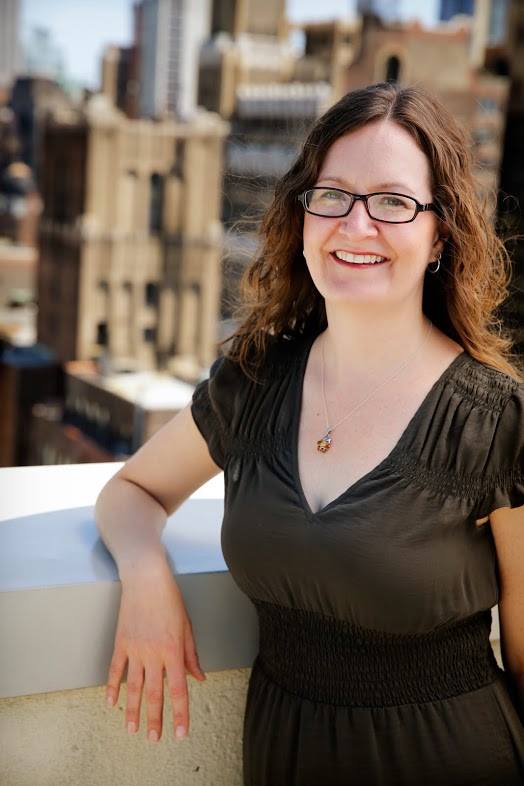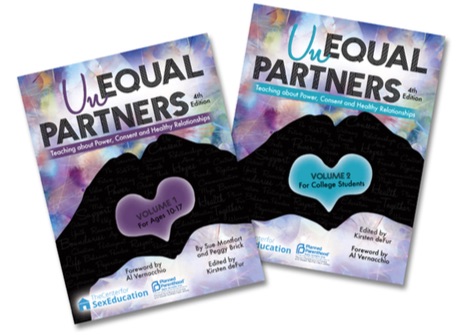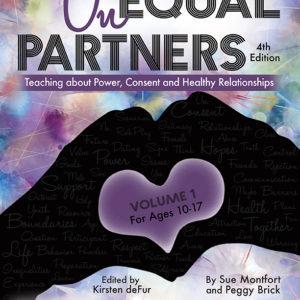
(Editor’s note: Kirsten deFur, the editor of the new, soon-to-be-released edition of Unequal Partners, introduces us to her the new manual below.)
I am absolutely thrilled to have had the opportunity to be the editor for the 4th Edition of Unequal Partners: Teaching About Power, Consent, and Healthy Relationships. The original manual, published in the late 90s and co-authored by award-winning sexuality educators Sue Montfort and Peggy Brick, was the product of in-depth research via focus groups with pregnant and parenting teenagers and their older partners. This research helped highlight the components of unhealthy relationships and abuses of power. In the 2nd and 3rd editions, more and more attention was given to helping young people develop healthy relationships, and recognize abusive behaviors in any type of relationship, including age-discrepant relationships. In the 4th edition, I wanted to help participants understand and analyze controlling behaviors so they can recognize them in their own relationships, and help others who may be experiencing an unhealthy or abusive relationship. In addition, it is absolutely critical to learn about healthy relationships alongside understanding unhealthy ones. In the 4th edition, I wanted to capture a holistic approach to relationships by examining topics such as ways people meet and ask each other out, when and how to seek and gain consent, how to handle and communicate about relationship problems, and break-ups that are healthy and safe.
As you can imagine, in order to cover all those topics, the 4th edition has grown significantly! There are two volumes now. Volume One has 30 lesson plans for young adolescents and middle adolescents, and Volume Two has 20 lesson plans for college-age students. Twenty-six sexuality professionals contributed to the manual, representing an outstanding level of expertise.
I’m particularly excited about the lesson plan Take A Selfie: Strategies for Self Care, by Ali Glaser. I’ve been doing violence prevention work for nearly 9 years, and thinking deeply about violence and abuse can certainly take its toll. This lesson plan has participants think critically about how self-care can play a role in their lives, and make a self-care plan. This lesson plan is included in both volumes of the manual.
The lesson plan You Free Friday Night? Meeting People, Asking Someone Out, and Being Rejected in Volume One covers three important topics that are often overlooked. Having a healthy approach to starting relationships, and if someone declines an offer, can contribute to healthy relationship behaviors in the long term. It’s also a blend of old and new- the first activity was written by Bill Taverner as part of a lesson plan from the 3rd edition, and the second and third activities I added to round out the lesson!
The lesson plan Baseball, Pizza, and Power, by Lindsay Fram, in Volume Two helps participants examine metaphors and euphemisms for sexual activity and how those can influence power dynamics in a relationship. This lesson brings in Al Vernacchio’s pizza metaphor for sex, which is particularly appropriate, since Al also wrote the foreword for the manual!
It’s particularly exciting to be working on this project as the topic of consent has been ever-present in the media. There are few tools available to help educators teach about this critical topic, especially for college and university settings. Unequal Partners will provide a valuable resource to educators helping students of many ages recognize unhealthy relationship behaviors and develop healthy ones.
The 4th Edition of Unequal Partners will hit the shelves soon! Folks can pre-order copies now!



